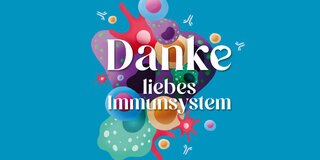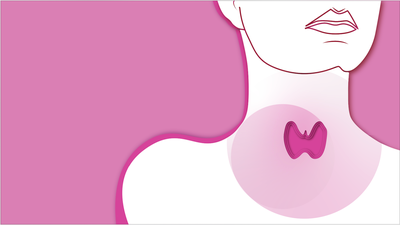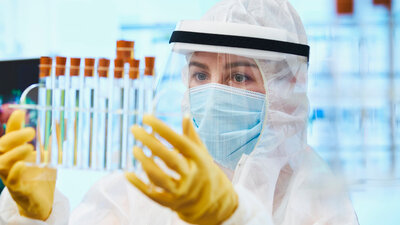Thank you, dear immune system!

© W&B/Patrick Paulin
For some children, living in a sterile plastic tent or a protective suit was the only therapy available once maternal protection was used up. Many of them still did not grow up to be adults. They died of unavoidable infections attacking a body without protection – as they had almost no immune system at all.
Today, there are other ways to treat hereditary and severe immune defects. Pharmaceuticals and antibodies replace the natural immune defence to a certain degree, and a bone marrow transplantation often solves the problem for good. Since 2019, the mandatory German newborn screening includes checks for the rare Severe Combined Immunodeficiency (SCID).
That’s why the immune system is so important
The fate of the ‘bubble babies’ of earlier times is the best demonstration of the importance of a functioning immune system. We are permanently attacked by bacteria, viruses, fungi and other pathogens. Mostly, we defeat them thanks to our immune defence. Without that defence, we would probably die pretty early from infections or cancer. And our body would be swamped with rubbish left by dying cells in our tissue if we did not have scavenger cells.
A finely adjusted system of cells, messengers and antibodies defends us against these dangers. Antibodies – so much talked about these days – are only one unit in this well-organised army. Without helper T cells, most antibodies would not even come into existence. But our immune system does not merely attack the pathogens themselves. It also destroys cells captured by viruses and some type of bacteria and then used for reproduction. Other players of the immune system make sure that this process does not get out of control.
Essentially, our immune system has two components: the inherent and the acquired immune system. But these terms are ambiguous, as both components are intrinsically inherent. The acquired component, however, has to get to know the pathogen first through contact. It then saves the information via memory cells. The inherent part of the immune system already has that recognition mechanism from the start. Many experts thus call the inherent component ‘unspecific’, the acquired one ‘specific’.
The inherent, unspecific part recognises pathogens, infected cells, and cancer cells based on typical unalterable substances on their surface. That is often enough to fight infections rapidly – and we notice little but a small inflammation. In some cases, however, our body needs help from our so-called specific defence after a couple of days. The specific defence is particularly effective: It recognises pathogens with precise receptors and reacts with the massive production of specific defence cells and antibodies.
Dendritic cells build the bridge between both immune system components. They are ‘guardian cells’ and circulate in the tissue while ‘tasting’ the substances they encounter. That is why they hardly miss any bacteria or viruses entering the body through injured skin. A complex system of messengers helps them. Dendritic cells can poison the pathogen themselves, or they can call for help and direct the helpers towards the infection.
Problems concerning the immune system
While pathogens can only enter through the skin after an injury, they have an easier game if attacking through the mucosa of the respiratory or digestive systems. Hence our immune system has built additional barriers – like the so-called Peyer’s patches, structures in the intestine similar to lymph nodes. The intestine is also full of plasma cells releasing antibodies all the time.
That is not without danger. For one, the immune system should certainly not be directed against foodstuff. The intestine also contains numerous beneficial and essential bacteria. Several mechanisms prevent an attack on these bacteria. Mucus limits their contact with the intestinal wall. And should they get in contact, the inner film of the wall sends out limiting signals.
Which poses the more general question: Why doesn’t the immune system attack the body’s own structures? Up until the middle of the last century, it was believed that that is impossible. By now, however, we know that it does happen – for example with autoimmune diseases like rheumatism or type 1 diabetes. Over three million people in Germany alone suffer from an autoimmune disease, although the majority of people is spared that fate.
This is what happens: The immune defence harms one’s own body. But the body has ways to prevent this. ‘For that, the immune system uses two paths’, explains Professor Lothar Rink, Director of the Institute for Immunology at the University Hospital Aachen. In the thymus, progenitors of T cells get in contact with substances produced naturally in the body. Cells clinging too weakly or too strongly to these substances get eliminated. Only the golden middle become T cells released into the body.
How the body’s reaction works
If a dangerous cell escapes the thymus, however, there is a second barrier working on several levels: For example, so-called regulatory T cells develop in the thymus. These can suppress auto-reaction and generally prevent the body from an attack of the immune system. ‘It always gets dangerous when a pathogen looks too similar to bodily substances’, says Rink.
But our immune defence is not only challenged by the need to differentiate between the body’s own and exogenous substances. But also by the cunning ways of the pathogens. ‘They continuously try to undermine and manipulate the immune system’, says Professor Christine Falk, President of the German Society for Immunology. ‘It is a permanent locking of horns.’
And after a while, the strength of the immune system decreases. That is why older people are more susceptible to infections and cancer. ‘The pool of reactive cells gets smaller, and the production of important messengers can decrease’, adds Falk. What can you do to prevent that? Even as a younger person? Christine Falk does not like the idea of ‘strengthening’ the immune system, as it is misleading. ‘Mainly, you should not harm the immune system, then it will do its job.’ It is important to avoid stress factors for your immune defence. Then our immune system will repay our efforts.






